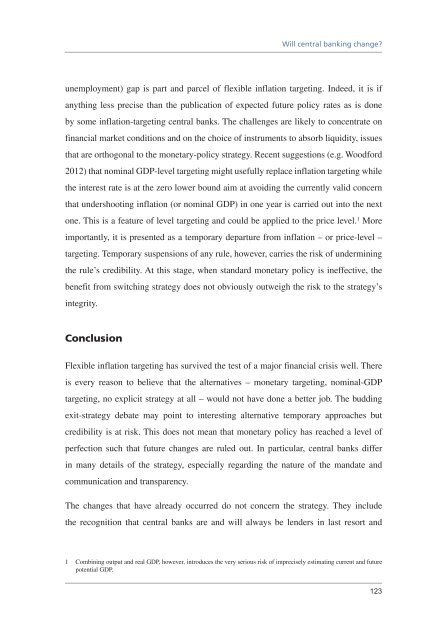Will central banking change?unemployment) gap is part and parcel of flexible <strong>inflation</strong> <strong>targeting</strong>. Indeed, it is ifanything less precise than the publication of expected future policy rates as is doneby some <strong>inflation</strong>-<strong>targeting</strong> central banks. The challenges are likely to concentrate onfinancial market conditions and on the choice of instruments to absorb liquidity, issuesthat are orthogonal to the monetary-policy strategy. Recent suggestions (e.g. Woodford2012) that nominal GDP-level <strong>targeting</strong> might usefully replace <strong>inflation</strong> <strong>targeting</strong> whilethe interest rate is at the zero lower bound aim at avoiding the currently valid concernthat undershooting <strong>inflation</strong> (or nominal GDP) in one year is carried out into the nextone. This is a feature of level <strong>targeting</strong> and could be applied to the price level. 1 Moreimportantly, it is presented as a temporary departure from <strong>inflation</strong> – or price-level –<strong>targeting</strong>. Temporary suspensions of any rule, however, carries the risk of underminingthe rule’s credibility. At this stage, when standard monetary policy is ineffective, thebenefit from switching strategy does not obviously outweigh the risk to the strategy’sintegrity.ConclusionFlexible <strong>inflation</strong> <strong>targeting</strong> has survived the test of a major financial crisis well. Thereis every reason to believe that the alternatives – monetary <strong>targeting</strong>, nominal-GDP<strong>targeting</strong>, no explicit strategy at all – would not have done a better job. The buddingexit-strategy debate may point to interesting alternative temporary approaches butcredibility is at risk. This does not mean that monetary policy has reached a level ofperfection such that future changes are ruled out. In particular, central banks differin many details of the strategy, especially regarding the nature of the mandate andcommunication and transparency.The changes that have already occurred do not concern the strategy. They includethe recognition that central banks are and will always be lenders in last resort and1 Combining output and real GDP, however, introduces the very serious risk of imprecisely estimating current and futurepotential GDP.123
Is <strong>inflation</strong> <strong>targeting</strong> dead? Central Banking After the Crisisthat they cannot disregard financial stability. The latter calls for instruments such asindependent micro-financial supervision and adequate resolution procedures, as well asmacro-financial supervision. The role of central banks in these areas remains to be fullythought through and experimented with.ReferencesDe Carvalho Filho, Irineu Evangelista (2011), “28 Months Later: How InflationTargeters Outperformed Their Peers in the Great Recession”, The B.E. Journal ofMacroeconomics 11(1), article 22.Frankel, Jeffrey (2012), “The Death of Inflation Targeting”, Project Syndicate, 16 May.Goodhart, Charles and Boris Hofmann (2008), “House Prices, Money, Credit and theMacroeconomy”, Working Paper No. 888, ECB.Issing, Otmar (2011), “Lessons for Monetary Policy: What Should the Consensus Be?”,Working Paper 11/97, IMF.Svensson, Lars E O (2009), “Evaluating Monetary Policy”, Discussion Paper No.7481, CEPR.Taylor, John (2010), “Getting Back on Track: Macroeconomic Lessons from theFinancial Crisis”, Federal Reserve Bank of Saint Louis Review, May-June, 165-176.Woodford, Michael (2012), “Methods of Policy Accommodation at the Interest-RateLower Bound”, presented at the Jackson Hole Symposium, “The Changing PolicyLandscape,” 31 August – 1 September 2012.124
- Page 5 and 6:
Centre for Economic Policy Research
- Page 8 and 9:
ForewordSince the onset of the Glob
- Page 11 and 12:
IntroductionLucrezia Reichlin and R
- Page 13 and 14:
Is inflation targeting dead? Centra
- Page 15 and 16:
Is inflation targeting dead? Centra
- Page 17 and 18:
Is inflation targeting dead? Centra
- Page 19 and 20:
Is inflation targeting dead? Centra
- Page 21 and 22:
Is inflation targeting dead? Centra
- Page 23 and 24:
Is inflation targeting dead? Centra
- Page 25 and 26:
Is inflation targeting dead? Centra
- Page 27 and 28:
Is inflation targeting dead? Centra
- Page 29 and 30:
Is inflation targeting dead? Centra
- Page 31 and 32:
Is inflation targeting dead? Centra
- Page 33 and 34:
Is inflation targeting dead? Centra
- Page 35 and 36:
Is inflation targeting dead? Centra
- Page 37 and 38:
Is inflation targeting dead? Centra
- Page 39 and 40:
Is inflation targeting dead? Centra
- Page 41:
Is inflation targeting dead? Centra
- Page 44 and 45:
Is inflation targeting passé?Frank
- Page 46 and 47:
Monetary targetry: Might Carney mak
- Page 48 and 49:
Monetary targetry: Might Carney mak
- Page 50 and 51:
Monetary targetry: Might Carney mak
- Page 52 and 53:
Is inflation targeting dead?Ben Bro
- Page 54 and 55:
Is inflation targeting dead?to rais
- Page 56 and 57:
Is inflation targeting dead?to ‘l
- Page 58 and 59:
Is inflation targeting dead?The cos
- Page 60 and 61:
Cheap talk is no alternative toinfl
- Page 62 and 63:
Cheap talk is no alternative to inf
- Page 64 and 65:
Cheap talk is no alternative to inf
- Page 66 and 67:
Cheap talk is no alternative to inf
- Page 68 and 69:
The evolution of modern central ban
- Page 70 and 71:
The evolution of modern central ban
- Page 72 and 73:
The evolution of modern central ban
- Page 74 and 75: The evolution of modern central ban
- Page 76 and 77: Inflation targeting: Fix it, don’
- Page 78 and 79: Inflation targeting: Fix it, don’
- Page 80 and 81: Inflation targeting: Fix it, don’
- Page 82 and 83: Inflation targeting: Fix it, don’
- Page 84 and 85: Inflation targeting: Fix it, don’
- Page 86 and 87: Inflation targeting: Fix it, don’
- Page 88 and 89: Inflation targeting: Fix it, don’
- Page 90 and 91: Inflation targeting: Fix it, don’
- Page 92 and 93: Nominal-GDP targets, without losing
- Page 94 and 95: Nominal-GDP targets, without losing
- Page 96 and 97: Reviving ‘money and banking’Mar
- Page 98 and 99: Reviving ‘money and banking’col
- Page 100 and 101: Reviving ‘money and banking’Thi
- Page 102 and 103: Reviving ‘money and banking’pro
- Page 104 and 105: Reviving ‘money and banking’200
- Page 106 and 107: A broader mandate: Why inflation ta
- Page 108 and 109: A broader mandate: Why inflation ta
- Page 110 and 111: A broader mandate: Why inflation ta
- Page 112 and 113: A broader mandate: Why inflation ta
- Page 114 and 115: Flexible inflation targeting:Perfor
- Page 116 and 117: Flexible inflation targeting: Perfo
- Page 118 and 119: Flexible inflation targeting: Perfo
- Page 120 and 121: Flexible inflation targeting: Perfo
- Page 122 and 123: Will central banking change?allowed
- Page 126 and 127: Will central banking change?About t
- Page 128 and 129: Central banking after the crisis: C
- Page 130 and 131: Central banking after the crisis: C
- Page 132 and 133: Central banking after the crisis: C
- Page 135 and 136: Challenges to inflation targetingaf
- Page 137 and 138: Is inflation targeting dead? Centra
- Page 139 and 140: Is inflation targeting dead? Centra
- Page 141: Fourteen world-renowned scholars, p



